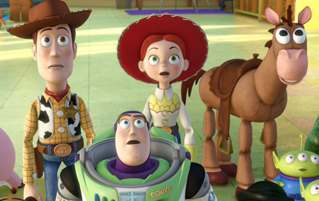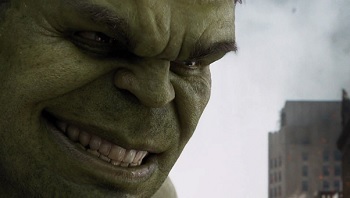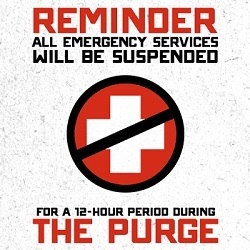5 Complex Philosophies (Secretly) Taught To You By Movies

Don't Miss
Hollywood movies aren't always as dumb as you think they are. Sometimes they (or their source material) have a profound philosophical message you might have missed beneath all the special effects and explosions. For example ...
Don't Miss
The Avengers Franchise Is All About Nietzsche (Being Wrong)

If Friedrich Nietzsche had lived to see the age of comic books, he probably would have been a fan. After all, Nietzsche actually coined the term "superman" before Superman, although he was German, so he pronounced it "ubermensch." So it's probably a good thing that he died before Marvel Studios went ahead and took a big dump on his philosophy.
Nietzsche's most famous quote to ever be misunderstood by a Kevin Sorbo movie was "God is dead," but he wasn't really saying that God literally choked on a pretzel. What he was really trying to say was that there is no objective morality, and without that, concepts like good, evil, equality, and human rights kind of go out the window. Nietzsche wasn't a big fan of democracy for this reason, because he thought all people aren't created equal, and ideally we'd be ruled by our betters -- supermen.

Or the angry militants who killed the superman's dad.
Avengers: Age of Ultron is about how this is actually a terrible idea. Part of what makes the Avengers franchise popular is that it gives depth to superheroes and portrays them as flawed people. The problem is that they're flawed people with superpowers, which makes them a danger to the rest of us, even while they're trying to protect society. The Avengers are striving for a Nietzschean ideal, but every so often their efforts just wind up turning New York into a pile of rubble while they eat shawarma like a bunch of assholes.
Nietzsche would actually have been critical of most comic superheroes as an expression of the ubermensch, because they limit themselves with a moral code. Superman and Batman have a policy against killing because they think it's just morally wrong, but Nietzsche believed that any policy that relied on higher morality was a weakness for any self-respecting ubermensch because he believed higher morality did not exist -- a true superman would only live by his own rules.

Or, to put it another way, they would be all Hulk and no Banner.
This is where Ultron comes in, because Ultron really is the ubermensch, and in case you didn't know, he's the villain. When Tony Stark becomes disillusioned about the Avengers' ability to truly protect mankind, he creates Ultron, who immediately decides that the only way to achieve world peace is to kill, just, everyone. As soon as he appears, Ultron quotes the famous philosopher Pinocchio: "There are no strings on me." It's a succinct way of declaring that he's bound by no laws of man or God, just the way Nietzsche would have wanted it.

"My only limits are my own imagination and a slapdick script."
The movie then kind of muddies its own message by creating Vision, a much better ubermensch tasked with cleaning up Stark's latest mess. But taken as a whole, the Avengers franchise makes things pretty clear that a world run by superheroes would just kind of royally suck.
Pixar Movies Are About Coping With Nonhuman Intelligence

Pixar movies are beloved by children and adults alike, because they're not just a load of fun, they're also deep and emotional. Except the Cars franchise, which is just an obvious cash cow. But it turns out that Pixar might be playing a long game of philosophical insight -- their movies all share a common theme about what it really means to be human. Except Cars.

Although we guess it is insight to human wants of maximum money for minimum effort.
According to Kyle Munkittrick of Discover magazine, Pixar movies at their core are all about humanity's struggle with the idea of nonhuman intelligence, a concept that we're going to have to deal with if we're ever going to face aliens, artificial intelligence, or if dolphins ever decide to stop messing with us and play it straight.
The key is that all of Pixar's films (except Cars, fuck Cars) take place in our world. Unlike other Disney films, there's no magic, unless you count the superpowers of The Incredibles as magic. The toys in Toy Story aren't animated by some witch's curse, they're just really alive.

And really horrified by what you did when you thought you were alone in your bedroom.
And that brings us to the next point -- every Pixar film includes at least one character who is not human, but displays human intelligence. Even Up had a dog who could talk through the magic of technology. The one exception, kind of, is The Incredibles, but we'll come back to that.
In some of these movies, especially the Toy Story franchise, the humans freak out when they discover that something they formerly believed to be inanimate shows human intelligence. In others, such as Ratatouille and WALL-E, the human characters come to accept the sentience of their nonhuman counterparts and form a team. In all cases (except Cars), humans have to deal in some way with the fact that they don't hold a universal monopoly on intelligence.

For starters, seafood sales probably plummeted.
Now, as we just mentioned, the outlier here is The Incredibles, but it's pretty much the exception that proves the rule. It doesn't focus on nonhumans, but it does focus on superhumans, but the theme here is that superheroes are people too. Rather than a society struggling with the idea of nonhuman intelligence, The Incredibles is all about society struggling with the idea of superhumans, and when the Incredibles win the day through the strength of their family bond, it teaches us that we can find common ground even with people who seem superior to us.
Oh, and that Larry the Cable Guy tow truck was pretty funny sometimes we guess?
The Purge Was About Durkheim's Theory That Society Needs Crime

If there was a way to throw a switch and just eliminate crime from society, most people would probably do it. It's not even up for debate -- it's difficult to imagine how anybody could be philosophically pro-crime. Even the Mafia would probably admit that nonMafia society would be better off if the Mafia didn't exist.
But that's kind of the position held by 19th century sociologist Emile Durkheim, who posited that society couldn't operate effectively without crime. Now, he wasn't suggesting that we need to go shoot up a mall if we're suffering a slow news week, but the idea is that crime is necessary in order for us to appreciate a society that regulates crime. It's essential to have crime so that we can appreciate order and give good people something to rally against. He even insisted that if crime didn't exist, society would have to invent it. That's where The Purge comes in.

Either that or it's all a scheme by Big Emergency Services to get an extra day off.
In the movie, the U.S. government passes a constitutional amendment so that, for one day every year, all crime (including murder) is legal. There are some rules; for example, you can't kill elected officials or use weapons of mass destruction, but the idea is that by getting all that aggression out in one annual blood orgy, society actually benefits. And it works -- in the world of the film, there's virtually no crime for 364 days of the year.
The scenario is of course completely absurd and would never happen in real life unless Donald Trump gets elected, but it's actually a fairly accurate illustration of the function that crime serves in Durkheim's theory. The annual Charles Bronson-style bloodletting basically serves as a yearly reminder to society about why law and order are good things. Essentially, the idea behind The Purge is that the government quits treating crime like an aberration, and recognizes that it's inevitable and, as Durkheim put it, a "social fact." Rather than try to eliminate it, which is futile, they contain it and regulate it, like a pressure release valve.

It's also the one day of the year you can dress like this and not be called an asshole.
Then again, if crime is legal for one night then the acts committed are literally not crimes, so maybe the whole thing kind of falls apart at that point. Hey, we're not saying the movie wasn't stupid.

12 Monkeys Is About Society's Often Arbitrary Concept Of Mental Illness

Mental hospitals weren't always pleasant places to be locked away. In the not too distant past, getting thrown in an asylum meant being subjected to all sorts of wacky science experiments like lobotomization and electric shock "therapy." The poor treatment of mental patients was a topic of concern for French philosopher Michel Foucault, who remarked that mental illness was treated more as a crime than a disease, which led him to wonder: What actually is insanity, anyway?
What in the hell could this possibly have to do with a Bruce Willis time travel movie? Well, in 12 Monkeys, time traveler James Cole (Willis) goes back to 1990 in order to figure out the cause of a disease that wiped out most of humanity. Unfortunately, he immediately gets thrown in a loony bin, because ranting about time travel and the apocalypse will do that. The Foucault lesson begins when he meets fellow patient Jeffrey Goines, probably the most fun Brad Pitt has ever had in an acting role.
Goines is clearly nuts, or so we're supposed to think. But according to him, crazy is relative. In one of his rants, he recounts how society labeled the scientist who discovered germs insane. But now, if you drop a burger on the floor and eat it anyway, you're insane. Sanity, he insists, is just another word for majority opinion. Likewise, according to Foucault, the reason we treat insanity as a crime is because we think of it that way. Rather than a neatly defined disease, insanity is what we call behavior that dissents from what society considers normal. Remember: Homosexuality used to be considered a mental illness, too.

"There's no right, there's no wrong, there's only popular opinion. ... Except for your blues albums. What the fuck, dude?"
As the film goes on, the line between sanity and madness starts to blur -- Goines might just be the sanest person in the asylum, and Cole might actually be delusional. And after enough "treatment," the doctors finally manage to convince Cole that everything is all in his head. At the same time, his psychiatrist starts to believe that Cole really is a time traveler and tries to re-crazy him while people start saying she's nuts.

Then Cole gets caught in a musical number, shot during World War I, and it gets even weirder.
This is Foucault in a nutshell -- that madness is relative and basically just amounts to a social crime. Foucault then proceeded to put his money where his mouth was and lived an intensely unpredictable life that included everything from endorsing the Ayatollah to a fatal interest in sadomasochist-themed bathhouses.
The Wizard Of Oz Is About Jungian Psychoanalysis

Modern psychology owes its origins to the theories of rival psychologists Sigmund Freud and Carl Jung. You're probably familiar enough with Freud's work to know that he was mostly concerned with sex, or your mother, or both, and in fact his dispute with Jung was that Jung didn't agree that everything came down to sex. It turns out that all you really need to do to get a neat crash course on Jung's psychoanalysis is watch The Wizard of Oz.

It syncs perfectly with Psychological Types and just, like, a shit-ton of Doritos.
In case you need to be reminded of the plot to The Wizard Of Oz, Dorothy gets swept up into a magical fantasy land where she has to travel to the Emerald City to find the titular Wizard who can show her the way back home. Along the way, she helps three male companions complete their broken personalities and defeats the evil Wicked Witch of the West. In the end, it turns out that it was all a dream (spoilers for an 80-year-old movie).
According to Jung, every female psyche has a male aspect, called an "animus," and women's psychological problems have a lot to do with their having trouble tapping into their inner male. Because he was kind of sexist, he used the animus theory to explain why women are moody and illogical -- they have trouble tapping into their male attributes, like brains and courage. Already you can see where this is going.

"We're not in Freudianism anymore, Toto."
In Jungian psychology, in order to realize her complete potential, a woman must go on a journey of self-discovery, called "individuation," in order to reunite herself with her inner male. And according to Jung, the animus is split into four distinct characters who each embody a different aspect of traditional masculinity -- the intelligent and logical man, the romantic man, the strong man, and the profound man. That last one, the psychological wizard of sorts, represents the end of her journey, when a woman is finally man enough to develop a brain, a heart, and some courage.
Oh, and before she realizes these aspects within herself, the woman tends to project them onto the men in her life. Kind of like how the Scarecrow, the Tin Man, and the Cowardly Lion all bear a striking resemblance to the three men who work on her uncle's farm.

All of whom are getting fired once he finds out his underage niece is having fantasies about them.
The four animus figures aren't the only characters running around in Jung's vision of the female brain. Everyone, man or woman, has a whole block party full of personalities running around up there. Such as the mother archetype, who gives us maternal guidance (kind of like Glinda, the Good Witch of the South), or the shadow archetype, which is our dark side we need to overcome (like the Wicked Witch of the West). We'll leave it to you to figure out what the flying monkeys represent.
Guess what? It turns out you don't really need any of that book shit to get smart. Just watch the movies in 5 Mind-Blowing Academic Theories as Taught By Classic Movies and 18 Adult Lessons You Missed In Famous Kids' Shows.
Subscribe to our YouTube channel, and check out Why Kanye West Is The Most Important Philosopher Of Our Time, and watch other videos you won't see on the site!
Also, follow us on Facebook, because we're dropping knowledge bombs all up in there.